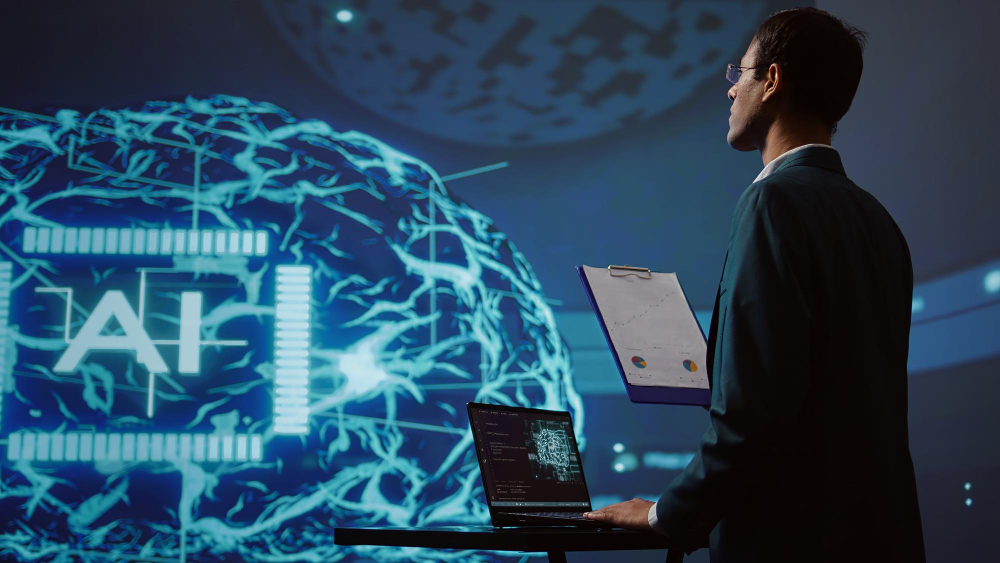Artificial Intelligence (AI) is becoming a key factor in the transformation of e-learning. AI capabilities enable the customization of learning content, the automation of administrative tasks and the creation of interactive learning experiences. In Slovenia, AI is already being successfully used in e-learning, as confirmed by numerous examples of good practice.
AI in e-learning
What is artificial intelligence and how does it work in education?
Artificial intelligence (AI) encompasses a variety of technologies that enable machines to perform tasks that would otherwise require human intelligence. In education, this means automating learning processes, analyzing data, and interactive communication with students.
E-learning and LMS systems
E-learning is learning using digital tools, often via online platforms. LMS (Learning Management System) are systems for managing learning content that enable access, progress monitoring, and organization of educational programs.
Why is AI becoming key in digital education?
AI in e-learning enables broader personalization, greater efficiency, and accessibility. This means that content is adapted to the individual, teachers save time, and students achieve better results.
Personalizing learning with artificial intelligence
How AI analyzes students' learning habits and needs
AI analyzes data on an individual's progress, errors, and learning pace, and then suggests appropriate tasks, exercises, or explanations. It can also be used to predict future learning difficulties and suggest support content in a timely manner.
Example: Smart Arena as a flexible e-learning system
Smart Arena is a Slovenian platform that uses artificial intelligence to personalize learning paths based on individual progress. The system automatically adapts learning content, suggests additional explanations, and analyzes the success of solving tasks in real time.

Benefits of personalized e-learning
Learning becomes more motivating, students progress faster, and frustration with tasks that are too long or too difficult is reduced. The approach is based on individualization, which means better engagement and long-term understanding of the material.
Task automation using AI in e-learning
What tasks can AI automate?
Among the most common are automated test grading, progress tracking, report generation, and student communication. In addition to these basic tasks, more advanced AI systems can also detect patterns in student behavior and alert teachers to potential problems, such as a drop in motivation, prolonged inactivity, or slow progress.
Useful tools for teachers
These tools help prepare worksheets, answer student questions, and even compile school materials. ChatGPT, for example, can generate draft lesson plans, while Copilot offers suggestions for writing, structuring content, or responding to emails. Tools like Smart Arena can extend basic functionality with class and individual performance analytics.
Saving time and focusing more on teaching work
Reducing the administrative burden allows teachers to focus more on explaining the material and supporting students. It also provides more opportunities for individual work with students, developing innovative teaching methods, and ongoing reflection on the learning process.
Teachers thus become more of mentors than mere knowledge brokers, which further contributes to the higher quality of e-learning. The reduction of administrative burden allows teachers to focus more on explaining the material and supporting students.
Generative AI and learning content creation
Generative artificial intelligence is a field that allows the creation of new content such as text, images, sound or even video. In the context of e-learning, this technology is used to produce dynamic, interactive and personalized learning materials.
Using generative AI tools, teachers can quickly create quizzes, lesson summaries, presentations, or visual aids with just a few inputs, greatly simplifying lesson preparation.

Ethical aspects of the use of artificial intelligence in education
- Data privacy and protection of personal information
It is important that AI systems protect students' personal data and provide control over who has access to it. - Algorithmic bias and its impact on learning outcomes
Algorithms can amplify certain biases if not properly controlled, which can affect ratings or suggested content. - EU guidelines for the ethical use of AI in schools
The European Commission recommends transparency, accountability and participation of all stakeholders in the introduction of AI in education.
Recommendations for implementing AI in e-learning
Step 1: Assessing the Institution's Readiness
Before introduction AI tools need to be assessed to determine whether the institution has the appropriate infrastructure, staffing, and readiness.
Step 2: Choosing the right AI tool (e.g. Smart Arena)
The choice should be based on the objectives of the lesson, the age of the students, and the level of digital literacy of the staff.
Step 3: Staff training and ongoing monitoring
Successful implementation of AI requires ongoing training, mentoring, and evaluation of the use of AI solutions.
An opportunity for the future of education
More and more schools and educational institutions around the world and in Slovenia are recognizing the value that AI brings to e-learning. From content personalization and task automation to innovative material creation and smart progress monitoring - artificial intelligence is becoming a key ally of teachers and students. However, responsibility, ethics and quality support in the introduction of technologies remain of key importance.
With solutions like Smart Arena, Slovenia has a unique opportunity to consolidate its position as a leader in digitally supported education. By continuing to invest in staff training, technology development, and collaboration among all stakeholders, we can use artificial intelligence in e-learning as a tool to create a more accessible, equitable, and efficient future of learning.





